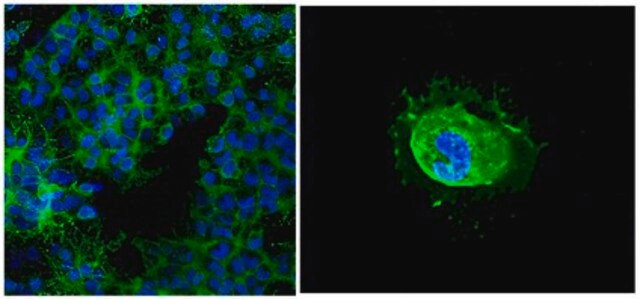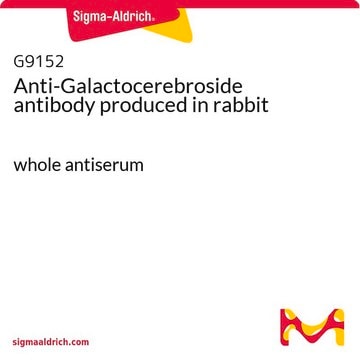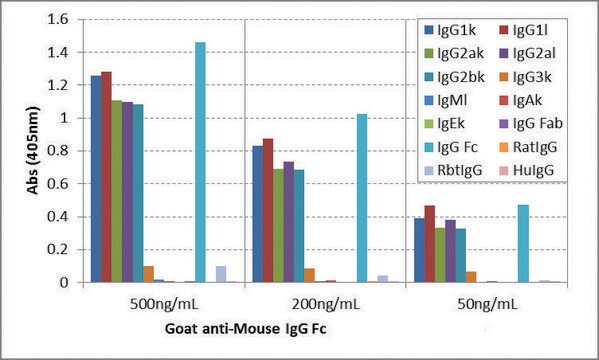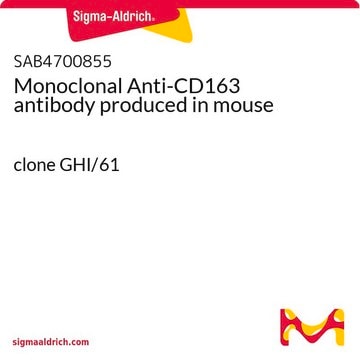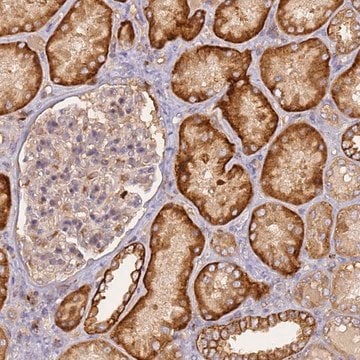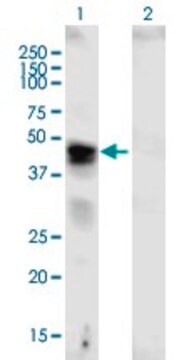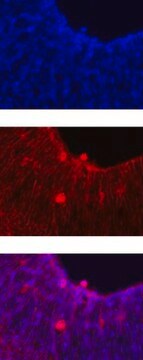추천 제품
생물학적 소스
rabbit
Quality Level
결합
unconjugated
항체 형태
IgG fraction of antiserum
항체 생산 유형
primary antibodies
클론
polyclonal
형태
buffered aqueous solution
분자량
28 kDa
종 반응성
mouse, human, rabbit, guinea pig, rat
농도
0.5 mg - 1 mg/mL
기술
western blot: suitable
NCBI 수납 번호
UniProt 수납 번호
배송 상태
wet ice
저장 온도
−20°C
타겟 번역 후 변형
unmodified
유전자 정보
human ... M6PR(4074)
일반 설명
Mannose-6-phosphate receptor (cation dependent) (M6PR) is a receptor for mannose-6-phosphate groups on lysosomal enzymes. It is an integral membrane protein that belongs to type I membrane-spanning glycoproteins. M6PR protein exists as a homodimer and localizes in the trans-Golgi reticulum, endosomes, and the plasma membrane. M6PR gene is mapped to human chromosome 12p13.31.
면역원
Synthetic peptide directed towards the N terminal region of human M6PR
생화학적/생리학적 작용
Mannose-6-phosphate receptor (cation dependent) (M6PR) aids in intracellular targeting of lysosomal enzymes. It mediates the export of newly synthesized acid hydrolases from the trans-Golgi network (TGN) to endosomes for their subsequent transfer to lysosomes. The presence of a cytoplasmic tail in M6PR protects it from lysosomal degradation. in vitro studies suggest that M6PR favors the secretion of pro-cathepsin D in breast cancer cells.
서열
Synthetic peptide located within the following region: RLKPLFNKSFESTVGQGSDTYIYIFRVCREAGNHTSGAGLVQINKSNGKE
물리적 형태
Purified antibody supplied in 1x PBS buffer with 0.09% (w/v) sodium azide and 2% sucrose.
면책조항
Unless otherwise stated in our catalog or other company documentation accompanying the product(s), our products are intended for research use only and are not to be used for any other purpose, which includes but is not limited to, unauthorized commercial uses, in vitro diagnostic uses, ex vivo or in vivo therapeutic uses or any type of consumption or application to humans or animals.
Not finding the right product?
Try our 제품 선택기 도구.
Storage Class Code
10 - Combustible liquids
WGK
WGK 3
Flash Point (°F)
Not applicable
Flash Point (°C)
Not applicable
시험 성적서(COA)
제품의 로트/배치 번호를 입력하여 시험 성적서(COA)을 검색하십시오. 로트 및 배치 번호는 제품 라벨에 있는 ‘로트’ 또는 ‘배치’라는 용어 뒤에서 찾을 수 있습니다.
Balraj Doray et al.
The Journal of biological chemistry, 277(21), 18477-18482 (2002-03-12)
The GGAs (Golgi-localizing, gamma-adaptin ear homology domain, ARF-binding) are a multidomain family of proteins implicated in protein trafficking between the Golgi and endosomes. Recent evidence has established that the cation-independent (CI) and cation-dependent (CD) mannose 6-phosphate receptors (MPRs) bind specifically
Pradipta Ghosh et al.
Nature reviews. Molecular cell biology, 4(3), 202-212 (2003-03-04)
The two mannose 6-phosphate (M6P) receptors were identified because of their ability to bind M6P-containing soluble acid hydrolases in the Golgi and transport them to the endosomal-lysosomal system. During the past decade, we have started to understand the structural features
A Schweizer et al.
Proceedings of the National Academy of Sciences of the United States of America, 94(26), 14471-14476 (1998-02-07)
The 67-amino acid cytoplasmic tail of the cation-dependent mannose 6-phosphate receptor (CD-MPR) contains a signal(s) that prevents the receptor from entering lysosomes where it would be degraded. To identify the key residues required for proper endosomal sorting, we analyzed the
Moutushy Mitra et al.
Molecular vision, 16, 828-842 (2010-05-13)
Previously we showed that epithelial cell adhesion molecule (Ep-CAM), a cell surface molecule, was highly expressed in primary retinoblastoma tumors. In the present study, we studied the genes regulated by Ep-CAM in a retinoblastoma Y79 cell line in vitro using
N Bannoud et al.
PloS one, 13(8), e0201844-e0201844 (2018-08-08)
Cancer cells secrete procathepsin D, and its secretion is enhanced by estradiol. Although alterations in the pro-enzyme intracellular transport have been reported, the mechanism by which it is secreted remains poorly understood. In this work, we have studied the influence
자사의 과학자팀은 생명 과학, 재료 과학, 화학 합성, 크로마토그래피, 분석 및 기타 많은 영역을 포함한 모든 과학 분야에 경험이 있습니다..
고객지원팀으로 연락바랍니다.